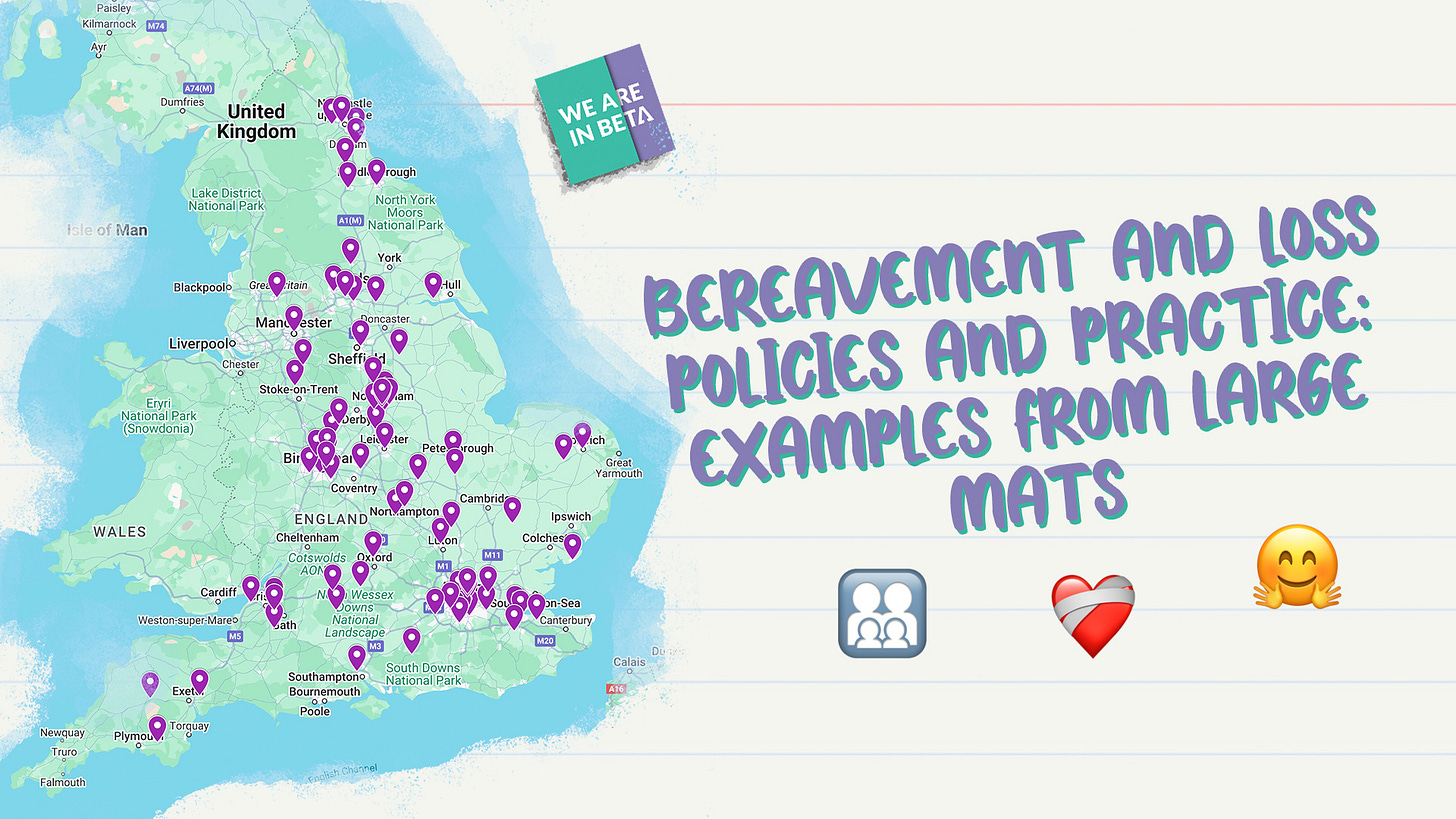Bereavement
Policies and practice to support staff and students: examples from large multi academy trusts
Your goal for your students - beyond getting them great outcomes - is to set them up for life.
Part of that is about helping them navigate difficult life events.
Few are more difficult than losing someone important - be it a friend, family member or teacher.
This week it was Dying Matters Awareness Week.
So to help you support your students and colleagues through bereavement and build the most compassion cultures in your schools as possible, our incredible event producer (and expert grief workshop facilitator), Kasia, has delved into the bereavement policies and practices in schools from large MATs.
If you are fortunate enough to have never suffered grief, it can be difficult to know how best to help others going through it. I hope what we have produced helps.
Whether you are a form tutor who wants to know more about how to have conversations about death or a school or MAT leader looking to improve organisational response, this week’s highlight from the We Are In Beta community will help.
We - schools - Are In Beta - always learning (when we are compassionate and respond well to those struggling with loss)
✍️ Bereavement and loss policies and practice: examples from large multi academy trusts.
The Childhood Bereavement Network estimates that approximately 45,000 children in the UK lose a parent each year. Additionally, many more experience the loss of a grandparent, sibling, friend, or beloved pet or are affected by non-death related losses such as divorce, separation or relocation to a different city or country.
When we also consider the bereavement experienced by school staff members, it becomes evident that the scale of grief and bereavement within the school community is significant.
To learn what bereavement policies should cover, how schools and MATs support grieving staff, students an parents and what resources they put in place…
Loss is a terrible thing to suffer. Showing comparison can create an incredibly strong organisational culture. So what you do to help?
Guidance for staff on dealing with conversations on death
Death can be a challenging topic to discuss with students. It can be difficult to know how to answer questions and what to say to best support students coping with a death in their family or in the school community.
This guidance below was extracted from the appendix of RET’s bereavement policy, which you can access alongside all others analysed here:
Allow conversations on death to be instigated by a student(s) rather than instigating them yourself.
Reassure the student(s) that it is OK to talk about death and normal to seek support from others when dealing with a bereavement.
Give students facts if a death has occurred in the school community. Stick to agreed lines of communication (which will be given to you by the Headteacher) but do answer questions within these and address any untrue rumours.
Allow the student(s) to express their feelings; be aware that bereaved people can commonly feel a mixture of sadness, anger, anxiety, confusion or guilt. Reassure them that their emotions are normal and that grief is complex.
Encourage the student(s) to talk about the person they have lost and to share their memories. They may also wish to share other experiences of grief and loss – reassure them that this is normal.
Encourage the student(s) to find outlets for their emotions which might include physical activity; meditation; prayer; writing; art; music etc
Encourage the student(s) to make use of the support being offered in school to work through their feelings
If a student asks you to share your own experiences of grief, do so if you are content to, but feel no pressure to and be aware of the emotional toll this may take on you.
If a student asks you to pray with them/for them and you are comfortable doing this you can. If you are not comfortable, please introduce them to a member of staff who can pray with them and have a dialogue around Christian beliefs on death.
Encourage the student(s) to discuss their feelings with their parents/carers or a member of their family they are close with.
Refer the student(s) for additional pastoral support if you feel they need to work through their feelings at greater length. CPOMs referrals should be made for any CP concerns.
5 ways to support bereaved staff
Flexible return to work
Compassionate leave
Arranging for work to be covered
Access to employee assistance programmes such as counselling and ocupational health support
Regular reviews
Schools and MATs who have policies in place share some really helpful and practical mechanics here.
5 ways to support bereaved students
designating a point of contact who can regularly check in and coordinate support
making adequate arrangements for the student’s return
offering a safe space where a pupil can go if they need time out from a classroom or playground because of their bereavement
offering flexible academic expectations for bereaved students who may struggle with concentration or motivation.
referring for external support services such as local bereavement centres and bereavement charities
Schools and MATs who have policies in place share some really helpful and practical advice and checklists here.
🔎 5 bereavement policy observations.
The full project shares 55+ observations from the n policies looked at.
Here are 5 that might get you thinking about what your school does:
🕌 Different faiths and cultures: 1 school/MAT provided detailed guidance about to tailor response for different faiths and cultures
📜 Initial response: 12 outline what the initial response to someone passing away should be
🤝 Support provided: 18 detail the specific support they offer to those grieving
✉️ Template letters: 5 provide sample letters to model how to share bas news compassionately
👨🏫 Teaching about grief: 7 specifically mention that they teach about death and bereavement
To read about the other 50+ observations and learn about the specifics how these schools support staff and students through bereavement….
Want us to research policies and practices for you?
Reply to this email to tell us what policy you’re writing and we’ll do a lot of the leg work for you.
Want do research like this with us?
Join our research team here, especially if you are interest in MAT, pastoral, curriculum and recruitment and retention related policy and practice - we have some new projects live.
🗒️ 8 bereavement case studies
You don’t have the time to read all the resources, so we’ve done it for you.
We’ve found the most practical bits and organised them into case studies about areas such as:
Template letters informing parents, staff and students
External organisations who offer support
Response checklists and flow charts
Recommended reading and books for children and adults
How to tailor response to different religions and cultures
and more
If you want to read more about how they codify these strategies, and you are a paying member of the community, you can read them
Case studies are a members only resource.
Not a member of Pastoral Champions? Get a trial here.
Not a member of Curriculum Thinkers? Get a trial here.
Not joined Trust Education Leaders yet? Register your interest here.
On a personal note.
I was very fortunate to not have experienced much grief in my life - that is, until recently.
In 2023 my wife and I experienced a loss I would not wish upon anyone.
Until you have been through it, it is impossible to fully comprehend others’ experience.
You are also completely unaware as to how common this grief is and how many people have been through it, until you share that you have too.
The really difficult part is that this type of loss is not visible and is often unspoken.
Meaning people can suffer in silence and isolation, which makes it harder to work through.
It is complex and knotty and seeps into aspects of your life you wouldn’t expect and affect your ability to work
That’s why I am so happy to see that these MATs and schools have these policies and practices in place and why I am so pleased that Kasia agreed to apply her experience of facilitating conversations for organisation about death to this research.
I truly hope it helps you build the most compassionate schools possible.
Thanks for reading.
@NiallAlcock and the We Are In Beta team
Sent this by a friend?
📱 Get 19,784 school leaders and teachers in your pocket - download We Are In Beta.
🚀 Looking for a new role? Get updates about specific jobs you’re looking for before anyone else.
🆕 New here? Catch up with previous editions, podcasts and webinars via the archive.






